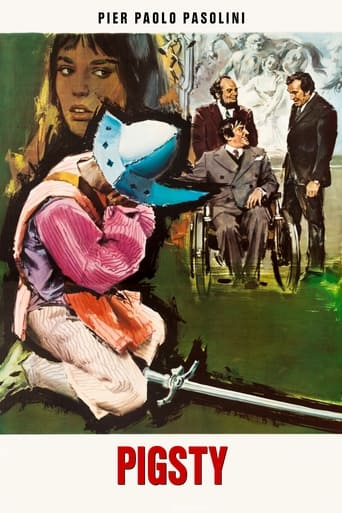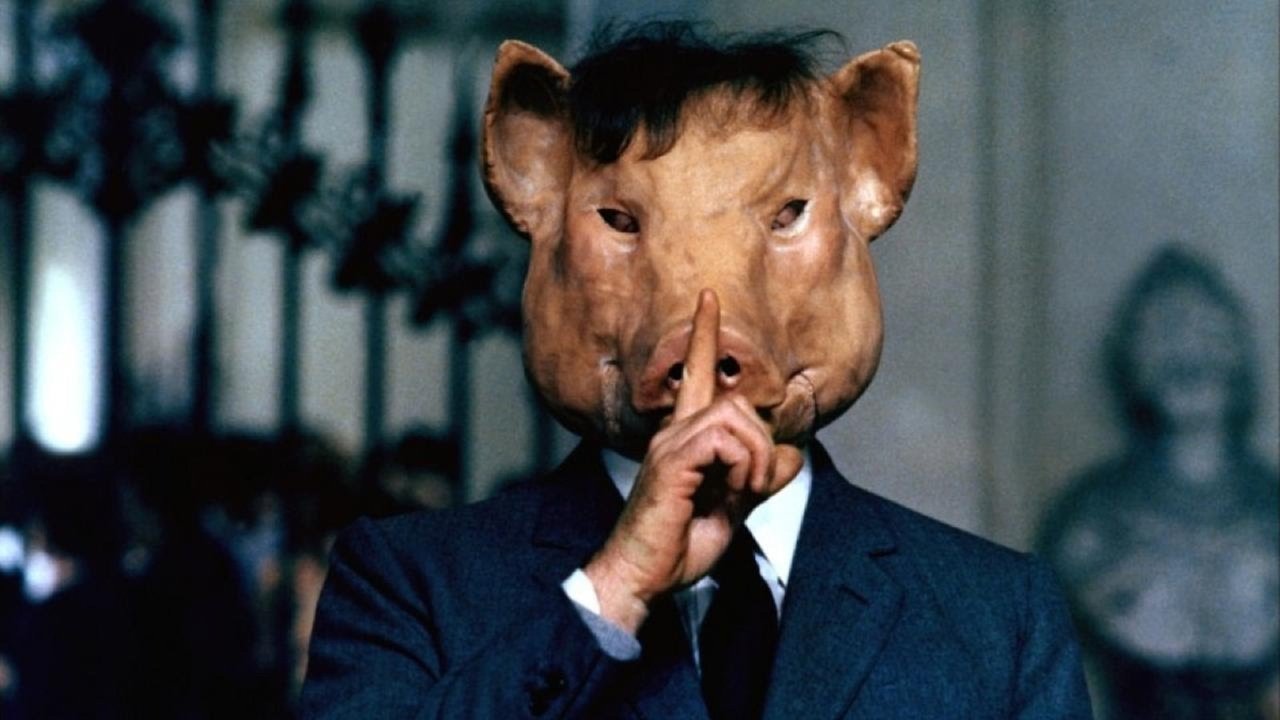Mariam Mansuryan
I thought this movie must had had something ingenious while watching it, but couldn't really understand it. It was about a boy who does something very strange that he doesn't want to tell anyone about. He kills pigs, and at the end gets consumed by these same pigs. To his bone, without any trace left of him. And one of the characters decides it would be best if he would just had disappeared. I don't want to immediately go to the semantics of this and ask the inevitable question: what do the pigs represent, and what does the boy represent, and what does his parents' big house represent. First I want to understand the plot.There are two parallel stories, one is about a traveller who looks like the protagonist, trying to survive in a lonely land, and the other one is about a rich boy from a rich family who doesn't do anything with his life. Who is 25 but hasn't yet kissed a girl. He also used to kill pigs. For fun. He didn't need to do it, he was just so rich he didn't need to do anything really. His father is a mockery of Hitler or one of his servants, that is obvious by all the ridiculous names of the officials. The war is over, the USSR is taking on. The pigs represent the weaker, the worse types. So in this case, it may very well be that the pigs are the Jews, the Soviets, whom they had been slaughtering with such light hands. Unconsciously perhaps, the father had sent his son to do that. And the son was his father's conscience. He got destroyed, completely by those same pigs he was eating before. The conscience was actually way bigger and freer than the confining large house he lived in. The conscience was in the mountains, killing people. That seems to be another version of the protagonist's life. He kills and eats a human there. Just the same way he killed pigs in the castle. It's as if this second world is the dark reality while the first world is the beautiful illusion. In reality, it is a person he is killing. And at the end, the protagonist gets crucified by a tribe of others. So happens in the castle, just by pigs, not anyone else. It's as if there is this higher world and all the officials live in this castle where nothing is real, while the boy's true residence is there. Now why do I think he is the conscience of the father? Maybe he isn't, he is just able to see the reality.While he was probably eating healthy and luxurious foods in his father's castle, the protagonist was in reality starving in the mountains. He had a spiritual need that could only be fulfilled by eating those pigs. It was hunger for destruction, hunger that no palace could fulfill.And what about the girl? The girlfriend of course showed the period of time, she was one of those hippy kids. So now is the time where people are going against the Soviet Regime. That means, that the German era is over, all their games are fake already. At the end, the father walks out of the house, with still his proud walk. He lives the place and disappears among the guests, the waiting crowd.The girl is also very young, only seventeen. In one scene, they are walking towards each other with a lake separating them. He asks her to kiss him, first she says no, then when they reach each other, the girl wants to kiss the protagonist, but he no longer wants that kiss. This shows the longing for desire. It's like in Michelangelo's Adam's Birth. Where Adam and God are reaching towards each other but there is always this slight distance between their fingers and I think it's that distance that gives the painting all its beauty. That distance is life. If they touch, nothing is so unknown and mysterious anymore.In another scene, they are both in the house. But he is sitting in the carriage while Ida invites him out. It's a carriage in the house. One that doesn't move. It's something that maybe used to work but not anymore. Completely pointless. That shows that the boy is stuck in his life, that he is going nowhere. While she wants to move on in her life.Father and mother care about him. Father also plays the harp, which, especially in one particular sequence, is shown to control the world. As if he is controlling the world without even leaving his palace. But I don't know whether this lasts for the entire movie. There was probably another instrument which overtook at the end, I just didn't notice it.There is a lot of loneliness in the protagonist's life. He is all alone, he lives in his world and Ida leaves him too. He has this sort of double existence in his huge bed and meditative world.I don't know what I thought about this movie, I think it is definitely rewatchable, there would definitely be new things I would understand if I were to rewatch it.
chaos-rampant
I thought I was going to be confronted with minor Pasolini here. I was wrong. The same caution applies here though for casual viewers. With Pasolini we come to the foot of a cave where a sage is rumored to live, we can either turn back because there's no ornate ceremony, go back to where we can be told riveting stories about heroes wrestling fate; or sit and listen (not all of it may be intelligible), enter and divine vision.It opens with young intellectuals in a lush villa ruminating on their exasperations like out of Godard, from the time when revolutions were felt to be afoot. Oh the cause may be worthy in Pasolini's eyes, most likely is; but he makes it a point to show the modern self secluded from it in idle comfort, obsessed with analyzing himself in the scheme of narratives, dissatisfied, full of unrequited cravings and contradictions.In a separate medieval story we see man as only one more beast of prey alone in the wilderness, reduced to eating a butterfly to stave his insatiable hunger. We see what lurks behind that civilized self that always expects to be pleased, or better, all that had to transpire for endless time in the wilds. It's important here to see both the contrast and the continuity. The cruel nature in man as nature.And then in a breathtaking scene we're sent scurrying through windswept volcanic rock to see the human beast confronting itself in the crossroads, someone else much like him, alone and wary. There are few scenes more primal than this in cinema.Back in the modern portion, the same meeting between rivals takes place now with a lot of coy evasion, irony and duplicity, in a palace instead of the wild, over drinks. We see how human structures in place foster collaboration in the end; but it's a corporate one for profit that puts the beast in fine clothes, changes his face even, but leaves the hunger intact.Pasolini gives us the same barbs about modern life as he has elsewhere, relishing the opportunity, but he's not a sweeping fool; in the medieval portion he makes it a point to show that it's civilized structures, church and army, that go out in the wild to punish wrongdoing, install a semblance of order.We could be talking for days about what he has woven here. Sin that you control and sin that you don't. Law as necessary civilization. Bartering as control over the narrative (pigsty / WWII in the film). Love that you provide for versus the abstract calling from inmost soul.So okay, his camera seems sloppy from afar; he wants it to be you who has the chance encounter in these wilds instead of something bled of its reality on a lavish stage, wants it to be primal, madness the gods whisper to you. You'll see near the end some marvelously elliptic narrative as he conjures visions, no accident of sloppiness there; Pasolini is once more anticipating Malick.And he's aghast at the base nature he sees in him and things, impurity weighs him down; the whole film says, I have these things gnawing inside of me that I'll pay the price for even if I didn't put them there myself. Pasolini at his rawest makes the rocks crack open.The most riveting thing about it is that we have this seer in the wild of soul, who can bring vision back. He is the one who can't stay for love because something more abstract calls his name. He is the one who strays in the pigsty at nights, who has sinned in the wilds, ate the flesh.
dbdumonteil
It's arguably his least accessible work.And probably his more boring too.Like in "Oedipe" ,or in "teorema" ,there is a mix of contemporary scenes and a tale of long ago ,which could happen anywhere ,in the Middle Ages or the antiquity -which Pasolini broached with his Gospel,Medea and Oedipe-."Porcile" bears the appropriate scars of the time .All the scenes between Jean-Pierre Léaud (fortunately,he is dubbed ,so the French -speaking do not have to hear his affected voice)and Anne Wiazemsky are terribly stodgy.The two "intellectual" "actors" epitomize ,as far as I'm concerned,the nadir of French acting.These interminable dialogs recall the dreadful rhetoric of GOdard's "La Chinoise" .Things go better when Pasolini directs the fathers: one of them,a former Nazi has A skeleton in the closet and the other one's son is a zoophilist (check the title).As for the Pierre Clementi sequences -in an undefined past,which deal with cannibalism (I killed my father/I eat human flesh),the connection with the main plot escapes me,I fear.A young person who wants to discover Pasolini should not begin with "Porcile" (or ,worse "Salo" )."Mamma Roma" "Il vangelo secondo Matteo" or "Medea" are wiser choices.
jackroberts2000
Yet again Passolini at its second best. Two stories , one movie and a lack of continuity. If you are in a depressing- poetic mood let yourself be manipulated by this euro flick . I mostly recommend this movie to fans of neorealism. Do not try to read into the stories. They are just twinkles, strange , powerful , disturbing : cannibalism , gratuitous nudity , desolation, hypocrisy, patricide. As with most of Passolini's works , here politics, religion and philosophy meet to throw up nonsense. Do not watch this movie with your date. If you have the stomach for this picture than you should watch : Salo 120 Days of Sodom (1975) by the same director now that's a movie for you!


 AD
AD


